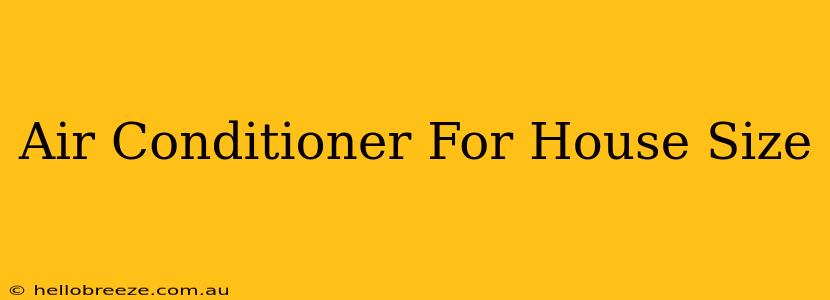Buying an air conditioner can feel overwhelming. With so many options and confusing specifications, figuring out the right size for your home is crucial for both comfort and cost-effectiveness. This guide will help you determine the appropriate air conditioner size for your house, ensuring you stay cool and save money.
Understanding BTU Ratings: The Key to Sizing Your AC
The British Thermal Unit (BTU) is the measurement unit that determines an air conditioner's cooling capacity. A higher BTU rating means the unit can cool a larger space. Choosing the wrong BTU rating can lead to either undercooling (too small) or wasted energy (too large).
Factors Affecting BTU Requirements:
Several factors influence the BTU requirement for your home:
- Square Footage: This is a primary factor, but not the only one. A larger house naturally requires a higher BTU rating.
- Ceiling Height: Higher ceilings require more BTU's to cool the same square footage.
- Number of Windows and Doors: More windows and doors mean more heat gain, requiring a larger unit.
- Window Type and Insulation: Energy-efficient windows and good insulation reduce heat gain, allowing for a smaller AC unit.
- Climate: Hotter climates necessitate higher BTU ratings.
- Number of Occupants: More people generate more heat, increasing BTU needs.
- Appliance Heat Output: Electronics and appliances generate heat, impacting the cooling requirements.
- Sun Exposure: South-facing walls receive more sun and require more cooling power.
How to Calculate the Right BTU for Your Air Conditioner
There isn't a single perfect formula, but here's a general approach:
- Measure Your Room's Dimensions: Accurately measure the length and width of the rooms you plan to cool.
- Calculate Square Footage: Multiply the length and width of each room to find its square footage. Add the square footage of all the rooms you want to cool.
- Consider Additional Factors: Add a buffer for the factors listed above. For example, if you live in a hot climate with many windows, you'll need a higher BTU rating. Online BTU calculators can help you account for these factors. Many home improvement websites offer free BTU calculators.
- Consult a Professional: If you're unsure, contacting an HVAC professional is always recommended. They can assess your home's specific needs and recommend the most appropriate AC unit.
Types of Air Conditioners and Their Suitability
There are several types of air conditioners to consider:
- Window Air Conditioners: Ideal for individual rooms, easy to install.
- Portable Air Conditioners: Offer flexibility but might be less efficient than other types.
- Central Air Conditioners: The most powerful option, cooling the entire house but requiring professional installation.
- Split System Air Conditioners: Similar to central AC but with separate indoor and outdoor units, providing greater flexibility in placement.
Energy Efficiency and Cost Savings
Investing in an energy-efficient air conditioner is crucial. Look for models with a high Energy Efficiency Ratio (EER) or Seasonal Energy Efficiency Ratio (SEER) rating. Higher ratings indicate greater energy efficiency and lower electricity bills.
Maintaining Your Air Conditioner for Optimal Performance
Regular maintenance is key to extending the lifespan of your air conditioner and ensuring efficient cooling. This includes:
- Changing air filters regularly.
- Cleaning the condenser coils.
- Scheduling annual professional maintenance.
By carefully considering the factors outlined above and consulting with professionals when needed, you can find the perfect air conditioner to keep your home comfortable and your energy bills manageable. Remember, proper sizing is crucial for optimal performance and cost savings.

